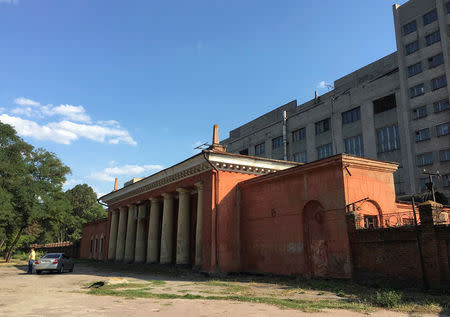Ukraine plant sucked into North Korea missile row has fallen on hard times
By Alessandra Prentice DNIPRO, Ukraine (Reuters) - The wall around the Yuzhmash rocket factory in east Ukraine is in places overgrown with weeds, a sign of hard times at a plant which a new study says could be the source of engines that power North Korean missiles. Workers at the plant have had their hours cut and wages are in arrears, but Yuzhmash denies the study's finding that unhappy employees could have been induced to steal engine technology and sell it to illicit arms dealers who passed it on to Pyongyang. The study by a former U.S. rocket scientist, published by the London-based International Institute for Strategic Studies (IISS), concluded that missile engines used by Pyongyang derive from designs linked to only a few former Soviet factories. It based its findings mainly on photographs taken by North Korea. A Reuters reporter who visited Yuzhmash in the city of Dnipro this week found staff struggling to make ends meet and facilities falling into disrepair. The only visible security cameras and guards around the plant were at the main entrances. "At the moment we're working a one-day week," said Valery Vasiliev, head of the trade union at Yuzhmash. The average wage is around $160 a month but even that is not always paid on time, he said. "Now there are some small wage arrears -- a bit more than 40 million hryvnias ($1.4 million). We're paying it off bit by bit. There are still debts for May and June," Vasiliev said. Yuzhmash used to be part of a state-run conglomerate that built rockets for the Soviet space and defense programs. When the Cold War ended, it became a Ukrainian state enterprise. Its workforce shrank but it limped on, producing space rockets, mostly in partnership with the Russian plants it had worked with in the Soviet era. After Russia annexed the Crimea peninsula from Ukraine in 2014, and a conflict began between government forces and separatists in east Ukraine, those ties were disrupted. "HUGELY DIFFICULT SITUATION" Yuzhmash General Director Sergei Voit told workers in January that annual revenue had fallen to a quarter of what it was before the conflict. He listed problems including "worn-out manufacturing capacity, a hugely difficult situation with personnel ... arrears on wages, power bills and debt repayments." The plant's chief economist, Dmitriy Nikon, told Reuters that new contracts were being signed with customers, the factory's finances had stabilized and there were plans to raise salaries by the end of the year. "It's still tough but nevertheless I think the worst of the crisis is over," he said. Nikon said that on average staff work three days a week, not just one, and earned an average of around $230 per month. Defending security at the plant, Nikon said the perimeter and areas inside it were guarded, and staff had to surrender sensitive documents after each shift. "We have not had a single instance of a finished product or a document going missing," Nikon said. A machine-worker who said he had worked at Yuzhmash for 36 years, but did not want to be identified because he feared repercussions, complained however of a lack of investment. "The workers aren't happy but there's not much we can do. The young people have all left, but what can someone like me do?" he said. "They say the pay might get better soon because of new orders, but it can't really get worse... They still owe us (unpaid wages)." NORTH KOREANS JAILED IN 2012 Technology from Ukraine has attracted the interest of North Korea in the past. In 2012, two North Koreans were sentenced by a Ukrainian court to eight years in jail after approaching an employee at a firm affiliated to Yuzhmash seeking secret rocket propulsion documents. The engine which is the subject of the new study is around two meters tall and one meter across. Yuzhmash's sister company Yuzhnoye, which handles design, said the engines used by North Korea did not match anything the plant had ever produced. The factory no longer has the capacity to manufacture the RD-250 engines referred to in the IISS report, it said, and all RD-250 engines fit for flight use that it produced had left the factory and been shipped to legitimate clients. Some U.S. intelligence officials also dispute the findings of the study. Ukraine is a signatory to an international pact called the Missile Technology Control Regime but the pact has no external verification mechanism. Ukrainian officials have said the components mentioned in the IISS study were more likely to have come from Russia. Moscow denies this. (Additional reporting by Pavel Polityuk, Editing by Timothy Heritage)




